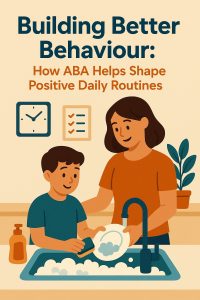BY: Aaron Verty
Uncategorized
Comments: No Comments
Building Better Behaviour: How ABA Helps Shape Positive Daily Routines
Daily routines are a crucial part of family life, but for children with autism or other developmental challenges, they can often be a source of stress and frustration. Routine tasks like getting dressed, brushing teeth, transitioning from one activity to another, or sitting at the dinner table can feel overwhelming both for the child and the parents. That’s where Applied Behaviour Analysis (ABA) can make a significant difference.
The Power of ABA in Shaping Daily Routines
ABA is a scientifically-backed therapy that focuses on teaching new skills, reducing problematic behaviours, and improving the quality of life for children and their families. One of the many strengths of ABA is its ability to target real-life skills, breaking them down into smaller, manageable steps that children can learn at their own pace.
ABA therapists work closely with children to identify specific goals related to daily routines, such as:
-
Getting Ready for the Day: ABA can help children follow a sequence of steps in the morning, from brushing their teeth to getting dressed. By reinforcing positive actions at each step, children gradually learn to complete the entire morning routine independently.
-
Transitions Between Activities: Transitions—moving from one activity to another—can be a challenge. ABA techniques help children manage these changes by offering visual supports, verbal cues, and consistent reinforcement, reducing resistance and anxiety.
-
Meal Times: Mealtimes are an important part of family life, but they can become a battleground over food preferences and behaviours. ABA can teach children appropriate table manners, help them learn to stay seated, and reduce behaviours like throwing food or becoming overly disruptive.
Targeting Behaviour with Positive Reinforcement
At the core of ABA is the principle of positive reinforcement. This means that when children exhibit desirable behaviour, such as completing a task or following a routine step, they are rewarded in a way that motivates them to repeat those behaviours in the future.
For example, if a child independently puts on their shoes or follows through with a transition from playtime to homework, they might receive praise, a small token, or extra playtime. These small rewards help reinforce the behaviour, leading to more consistent actions over time.
Creating Smoother Family Life
By targeting real-life skills, ABA doesn’t just improve individual behaviours—it also enhances the overall flow of family life. Parents no longer have to fight over everyday tasks, and children experience more success in their daily routines. ABA provides families with clear strategies and tools to support their child, promoting smoother transitions, improved cooperation, and less stress.
Moreover, ABA is individualized to suit the child’s unique needs and developmental level. Whether it’s working with a toddler on basic self-care skills or helping a school-age child stay organized and focused, ABA adapts to ensure each child makes meaningful progress at their own pace.
Involving the Whole Family
ABA is not just for the child—parent training is an integral part of the process. By teaching parents how to implement ABA strategies consistently at home, therapists empower families to maintain progress outside of therapy sessions. Parents learn how to use reinforcement techniques, manage difficult behaviours, and break tasks down into smaller, more manageable steps.
This collaborative approach ensures that skills taught during therapy sessions are generalized to the child’s everyday life, leading to lasting, positive changes in behaviour.
Conclusion
ABA isn’t just about reducing challenging behaviours—it’s about building better behaviours that improve children’s ability to participate in daily life. Whether it’s getting ready in the morning, following through with tasks, or managing transitions, ABA helps children develop the skills they need to lead more independent, successful lives. With the right support, families can enjoy smoother, less stressful routines, and children can feel more empowered and capable in their daily activities.
If you’re interested in learning how ABA can help your child build better behaviour and improve daily routines, contact us to schedule an assessment today.
